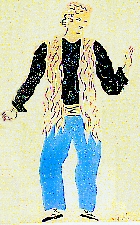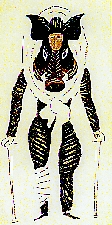|
||||
|
Home | Composers | ESTHER DE CARPENTRAS [Esther of Carpentras] |Esther of Carpentras - historical background | |
||||
|
LES MALHEURS D'ORPHÉE (The Misfortunes of Orpheus) Opera in Three
Acts Duration: 35 minutes
|
||||
One day walking down a deserted street in Aigues-Mortes [Camargue], I passed the window of a shop that was like a dark eye staring out into emptiness, and in that window I saw among the humble collection of glass beads, celluloid combs, and exaggerately pink soap an oval porcelain plaque. On it were pictured two clasped hands, prominent against a blue background. The inscription read: "To meet again....". Which village fisherman would eventually buy this plaque to hang over his bed? For which village Orpheus might it be destined? "I am haunted by the idea of composing an Orpheus drama. It is such a magnificent subject, but I want it to be about humans. Since nothing in life is pre-ordained, it's not necessary that Orpheus rediscovers Euridice. It's enough that despite everything in his heart and his music, he wanders around without finding her, and has to learn to live with the animals like a proper man, in the knowledge that he will not be reunited with her until he dies." |
||||
|
ACT I Orpheus is a folk-doctor - a 'rebouteux' or bone-setter who lives a lonely life on the edge of a village. Near to him are the workshops of the wheelwright, the farrier, and the basket-maker. Overture in the form of a vocal trio: the three artisans sing of their way of life and are worried about their friend Orpheus and his "mysterious and miraculous ways": instead of tending flocks and orchards like the rest of the community, he opens his stable to wild beasts and gives them healing potions. Before long, warn his friends, the animals will devour him. Solo: Orpheus sings of Euridice, his betrothed. She is the most beautiful of the four gypsy sisters who came to the village in their caravan only a few days before, but have now returned to the gypsy camp in Les-Saintes-Maries-de-la-Mer. The chorus warn Orpheus to beware of this "race of thieves and marauders" and promises misfortune to anyone who takes a wife from another region. Second solo: Euridice recognises that her betrothal to Orpheus breaks her own people's rules as well as his: she has now fled from the gypsy camp, but her outraged relatives are now tracking her down, intent on bringing her back - dead or alive. The artisans are moved by the plight of the lovers, and urge them to hide in the forest among the wild beasts. When the gypsies arrive the beasts will show them Orpheus's abandoned dwelling, and set them on a false trail. ACT II The couple have taken refuge in a deserted hut in a hollow of the forest. Eurydice is mortally ill, and Orpheus's potions are of no avail. Ensemble: a bear, a fox, a wild boar, and a wolf - all of whom have "lost the taste for blood" - are gathered in sympathy round the recumbent Euridice. Duet: the couple express their love for each other. Euridice now sings of the "shades of a night without tomorrow" that is already darkening her eyes, and begs the animals to take care of Orpheus. The animals swear on oath that they will do so. But Orpheus is beside himself with grief. Euridice utters her last words. Her lifeless body is carried off by the animals, who sing a strident funeral ensemble. Act III Orpheus has returned to the village. Surrounded by his implements and potions, he grieves, head in hands, at his loss and his helplessness. The three sisters of Euridice enter. With a kind of lustful anger, they accuse Orpheus of causing Euridice's death, and swear vengeance. Aria: Orpheus welcomes the thought of a death that will re-unite him with his beloved. The sisters advance on him with scissors, cord, and whip. Orpheus is savagely slain. The gypsies acknowledge, too late, that "the unfortunate Orpheus loved her well". Curtain. Les malheurs d'Orphee was commissioned by the Princess Edmond de Polognac, and composed at the Milhaud home, L'Enclos, near Aix-en-Provence, during the autumn of 1924. It was first performed in May 1926 at the Théâtre de la Monnaie in Brussels.
|
||||
|
||||
|
Material Copyright © 2002 David Drew. |
||||


